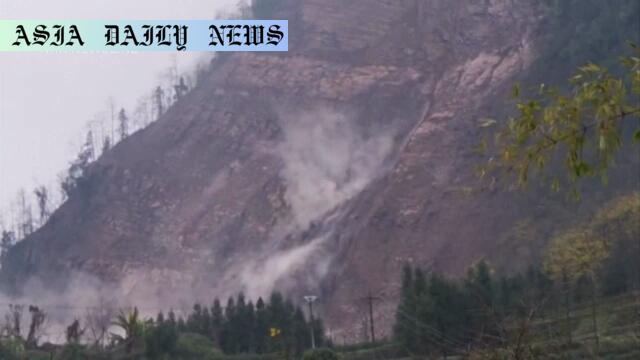Landslide: Massive landslide in Sichuan leaves over 30 missing; rescue operations underway.
Key Point 1: Over 30 people are missing after a massive landslide in Sichuan, China.
Key Point 2: 10 houses were buried by the landslide in the mountainous area.
Key Point 3: Rescue efforts are ongoing as over 200 residents have been evacuated.
Key Point 4: President Xi Jinping urged swift action to prevent further disasters.

30 Missing in Sichuan Landslide
A catastrophic landslide struck the Sichuan province in China on Saturday, leaving more than 30 people unaccounted for. The landslide occurred in a mountainous region where heavy rains have been causing instability in the terrain. Entire families were displaced as the disaster buried 10 houses under tons of displaced dirt and rocks.
Rescue Operations in Full Swing
Local authorities, including police forces and fire department personnel, have been working tirelessly to locate the missing individuals. Swift action is critical, as the affected area remains precarious, with the potential for secondary slides threatening the safety of rescue teams. Reports indicate that 200 people from surrounding neighborhoods have been evacuated to avoid further loss of life.
Xi Jinping’s Commitment to Disaster Relief
Chinese President Xi Jinping has emphasized the importance of prioritizing rescue and relief efforts. He has directed government officials to allocate resources effectively to maximize recovery efforts. This includes not only the immediate evacuation and rescue missions but also long-term mitigation strategies to prevent such tragedies in the future.
Impact on the Community
The affected region is a close-knit, rural community leaning heavily on agricultural practices for their livelihood. The loss of homes, belongings, and crops further compounds the emotional and economic toll this disaster has placed on the victims. Local governments have pledged to provide financial support to rebuild homes and livelihoods and ensure that temporary housing is made available for those displaced.
Call for Infrastructure Improvements
This tragic event highlights the vulnerability of Sichuan’s mountainous communities to natural disasters. Experts have called for investment in slope stability analysis, early-warning systems, and sustainable land management practices to reduce the risk of similar disasters. Enhanced monitoring technologies, such as drones and sensors, could play a significant role in detecting signs of potential landslides and providing critical early warnings.
Global Support and the Role of Awareness
While this disaster is regional, its implications are global. Climate change, coupled with population growth, has placed immense pressure on vulnerable lands around the world. This event serves as a stark reminder of the importance of international cooperation in disaster management and relief efforts. Sharing best practices, technological innovations, and providing financial aid can significantly reduce the impact of future natural disasters.
Conclusion
As Sichuan recovers from this devastating landslide, the resilience and spirit of the affected community will play a vital role in rebuilding efforts. The rescue operations underline the critical importance of preparedness and swift action in the face of natural disasters. It is incumbent upon governments and global organizations to learn from this tragedy and take proactive measures to protect life, property, and nature itself in regions prone to such calamities.



Commentary
The Human Cost of Natural Disasters
Natural disasters serve as a harsh reminder of nature’s unpredictability and devastating power. The landslide in Sichuan is no exception, leaving over 30 people missing and countless families shattered. Such events ripple through communities, leaving both immediate and long-term scars that can take years to heal. The human cost of this disaster should compel authorities to invest more in disaster preparedness and response mechanisms.
Importance of Leadership in Crisis
President Xi Jinping’s directive to prioritize rescue efforts and prevent secondary disasters highlights the critical role of leadership during crises. Timely decisions, the allocation of resources, and a focus on human life over material losses can significantly reduce the impact of disasters. Beyond immediate recovery, however, effective leadership should also aim to frame policies that minimize such risks in the future.
Learning from Disasters
Every disaster is a learning opportunity. The Sichuan landslide underscores the need for stronger infrastructure, environmental conservation, and early-warning systems. While nothing can completely prevent natural disasters, countries can significantly reduce risks through advanced technology and preventive measures. Proactive planning and preparedness are key to safeguarding communities and preserving lives.
Global Perspective
This tragedy isn’t just China’s problem—it’s a global concern. Climate change is intensifying natural disasters worldwide, from hurricanes to wildfires to landslides. International collaboration in disaster management, technological innovation, and policy-making is becoming increasingly essential. The Sichuan crisis is a reminder for all nations to act swiftly for a sustainable and safe future.
The Path Forward
As rescue operations continue, the global community must stand with Sichuan in solidarity. Local and international support will be instrumental in rebuilding the lives of those affected. At the same time, the lessons from this tragedy should inspire proactive efforts worldwide to prevent such calamities or at least mitigate their devastating impact.